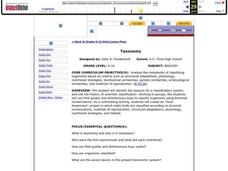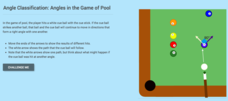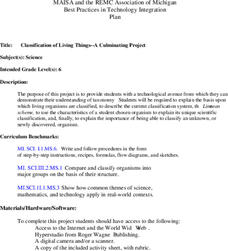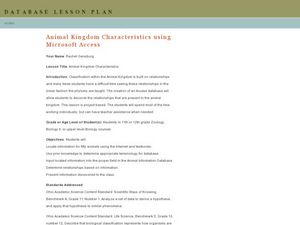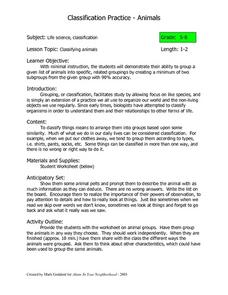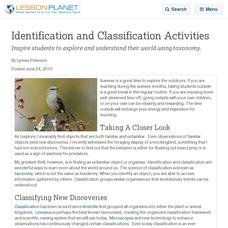Curated OER
Protists - The Protozoans
Five pages provide thorough coverage of three protozoans: euglena, amoebae, and paramecia. For each, junior biologists read factual text, label the organism, and write answers to several questions. This neatly organized assignment is...
Curated OER
What Class Are You In?
Classifying animals has never been this much fun! Pupils discuss the animal groups, fish, reptiles, amphibians, mammals, birds, and also identify their characteristics. Then, they take pictures of animals and classify them in a group...
Curated OER
Taxonomy
Young scholars analyze the complexity of organism classifications based on certain criteria. In this classifying organisms lesson students study taxonomy and gather information and leaves to do their own experiment on classification.
Curated OER
Taxonomy Concept Map
Reinforce learners' knowledge of scientific taxonomy with a helpful concept map learning exercise. Using a word bank, young biologists fill in the blanks to complete the description of organism classification.
CK-12 Foundation
Angle Classification: Angles in the Game of Pool
Make a game of angle classification. Using the direction of the pool ball, scholars determine the measure of the created angles. They work to create and classify different types of angles throughout an engaging interactive.
Curated OER
Classification of Living Things
Sixth graders are provided with a technological avenue from which they can demonstrate their understanding of taxonomy. They will be required to explain the basis u pon which living organisms are classified.
Curated OER
Food Classification
Students are introduced to classification and some of the difficulties surrounding classification and how classification systems need to be able to adapt and how they may need to be changed when new information is discovered. They...
Curated OER
Classification of Life
In this classification of life worksheet, students use an on line source to answer questions about how species are classified, named and grouped. They give the classification of a bear, an orchid and a sea cucumber.
Curated OER
Classification of Organisms
For this classification worksheet, students solve 3 classification riddles, complete 6 true and false questions, complete 4 sequences, and solve a riddle about the classification of an animal.
Curated OER
Animal Kingdom Characteristics using Microsoft Access
Students create a computer database to discover relationships present in the Animal Kingdom. In this classification lesson, students enter data into a Microsoft Access database. They answer questions on a worksheet and create a visual...
Curated OER
Levels of Classification
Students use diagrams to compare structural differences that taxonomists use to classify animals. For this classification lesson plan, students compare structures of different species from given diagrams. In one diagram they identify the...
Curated OER
What's Your Classification
Students classify animals. In this animal groups lesson, students watch a video on animal groups and review the six animal groups. Students practice classifying animals using stuffed animals.
Curated OER
Classification Practice-Animals
Students use pictures of animals to make a classification system. In this classification lesson plan, students are given pictures of different animals. They create a classification system for the animals and identify what they have in...
Curated OER
Introduction to Classification
Fourth graders design a classification system to categorize animate and inanimate objects. They discuss the advantages of grouping things as they classify buttons, leaves, shells.
Curated OER
INSECT TAXONOMY VIA THE INTERNET
Seventh graders explore how to classify insects and organize information.In this insect classification lesson students use the Internet to retrieve information on insects then organize the pictures to make a book project.
Curated OER
Regents High School Examination: Living Environment 2009
Emerging ecologists need a full understanding of life, from the inner workings of a cell to the complex relationships among organisms. This examination is meant to assess high schoolers after an entire year course on the living...
Curated OER
Reading the River - Biological Classification
Youngsters create a list of grocery store items and then work together to categorize them as if they were setting up the shelves of the market. Then they are given a box of miscellaneous objects to practice categorizing. With these two...
Curated OER
Identification and Classification Activities
Explore and understand your world with taxonomy.
Curated OER
Spring
Young scholars examine lichens in an outside field trip. Students explore the diversity of this organism and ask questions about them.
Discovery Education
Clutter Cutter
Challenge young learners to cut the clutter with this fun engineering project. As employees of a home and office supply company, young engineers are asked to develop devices that organize everyday items. After participating in a...
Curated OER
From Curiosity Cabinet to Museum Collection
Learners study binomial nomenclature and museum-based research. They create a curiosity box, label the objects in their curiosity box , develop a classification scheme for the objects, and create a database of all objects collected by...
Curated OER
Soil Characteristics
Components of soil, such as inorganic or organic materials are detailed along with the main contributions of each. Deposits, weathering, and distinct types of characteristics and properties of soil classes are given.
Curated OER
Campbell's Biology
Six chapters of a biology characteteristics of different domains xt are covered in this twenty-page assignment. Biology buffs chart the characteristics of different groups of organisms and address many critical-thinking questions about...
Curated OER
Echinoderms
Echinoderm structure and characteristics are the focus of this reading comprehension and labeling worksheet. Attractive diagrams and ample information make this a suitable homework assignment for your biology buffs when learning about...




